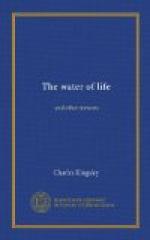personal independence, that civil and religious liberty,
which is theirs by law and right; if they will conduct
themselves, not as lords over God’s heritage,
but as examples to the flock; if they will treat that
flock, not as their subjects, but as their friends,
their fellow-workers, their fellow-counsellors—often
their advisers; if they will remember that ‘Give
and take, live and let live,’ are no mere worldly
maxims, but necessary, though difficult Christian
duties; then, I believe, they will after awhile receive
an answer to their call such as they dare not as yet
expect; such an answer as our forefathers gave to
the clergy of the early Middle Age, when they showed
them that the kingdom of God was the messenger of
civilization, of humanity, of justice and peace, of
strength and well-being in this world, as well as
in the next. The clergy would find in the men
and women of London not merely disciples, but helpers.
They would meet, not with fanatical excitement, not
even with enthusiasm, not even with much outward devotion;
but with co-operation, hearty and practical though
slow and quiet—co-operation all the more
valuable, in every possible sense, because it will
be free and voluntary; and the Bishop of London’s
Fund would receive more and more assistance, not merely
of heads and hands, but of money when money was needed,
from the inhabitants of the very poorest and most
heathen districts, as they began to feel that they
were giving their money towards a common blessing,
and became proud to pay their share towards an organization
which would belong to them, and to their children
after them.
So runs my dream. This may be done: God
grant that it may! For now, it may be, is our
best chance of doing it. Now is the accepted
time; now is the day of salvation. If these masses
increase in numbers and in power for another generation,
in their present state of anarchy, they may be lost
for ever to Christianity, to order, to civilization.
But if we can civilize, in that sense which is both
classical and Christian, the masses of London, and
of England, by that parochial method which has been
(according to history) the only method yet discovered,
then we shall have helped, not only to save innumerable
souls from sin, and from that misery which is the
inevitable and everlasting consequence of sin, but
we shall have helped to save them from a specious
and tawdry barbarism, such as corrupted and enervated
the seemingly civilized masses of the later Roman
empire; and to save our country, within the next century,
from some such catastrophe as overtook the Jewish
monarchy in spite of all its outward religiosity;
the catastrophe which has overtaken every nation which
has fancied itself sound and whole, while it was really
broken, sick, weak, ripe for ruin. For such,
every nation or empire becomes, though the minority
above be never so well organized, civilized, powerful,
educated, even virtuous, if the majority below are
not a people of citizens, but masses of incoherent
atoms, ready to fall to pieces before every storm.




